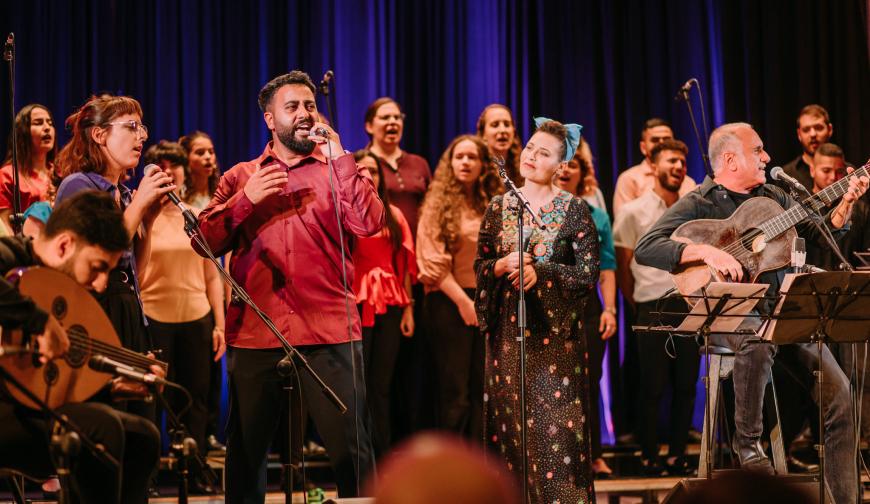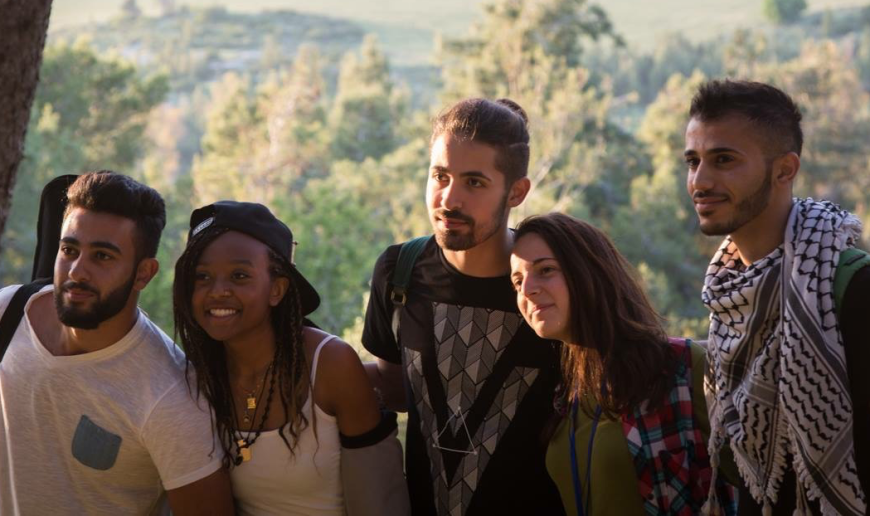
In a political conflict as long and as littered with wrongs and horrors as the Israeli-Palestinian wars, is it ridiculous to dream of peace? In a time when extremists hold most of the political power and control the narrative, how do we amplify the voices of those seeking an alternative?
We will get a chance to find out when the Jerusalem Youth Chorus (JYC) begins its fifth U.S. tour on April 1 in Los Angeles at a private residence. (Some tickets are still available.) The tour — which is facilitated by the One America Movement, a nonprofit that works with American communities of faith to “confront toxic polarization” and to build bridges across religious, political, and racial divides — continues April 9 in Washington D.C. at Adas Israel Congregation and April 14 in Boston at the Central Reform Temple at Emmanuel Church.
JYC hails from a divided city: broadly speaking, Israeli Jews in the western half, Arabs and Palestinians in the eastern half, though there are many different communities within the city, separate from each other. The teenage members of the chorus, founded in 2012 by Micah Hendler, then a recent college graduate, meet twice weekly during the nine-month school year to sing but, just as importantly, to share stories and learn about each other. They don’t come to make peace, according to the chorus’s website. “We tap into their curiosity to meet the otherwise inaccessible ‘other,’ the universal human desire to have one’s voice heard, and we add opportunities to learn English and travel the world.”
The group comprises about 30 singers from both east and west Jerusalem, with the Palestinians themselves divided into Muslim, Christian, and Jewish segments. Overcoming cultural differences dwarfs the challenges of the music. And Hendler admits to making mistakes in his first year after founding the chorus:
“Where I had to learn the terms of program management to correct those mistakes, I did not lose trust politically. I came to Jerusalem with the support of great regional partners, and I was able to begin recruiting vocal talents from high school to high school on both sides of the Green Line. And I knew how to talk to them and meet them where they were, in their languages, which goes a long way. I had told myself, ‘If I have 10 committed singers by January, that will be success.’ By October of that year, we had 80 auditions, the majority of which came from east Jerusalem, which no political analysis I had ever read would have predicted. But we were able to access these teens as teens first, and ‘Israeli’ or ‘Palestinian’ second, and when you look at people as people, a lot more becomes possible.”
In 2014, the Gaza War erupted and with it rocket attacks on Jerusalem. To Hendler’s surprise, the chorus members kept coming to rehearsal. “Our singers came that summer not just because we were traveling to Japan — they could have gotten out of many rehearsals with legitimate excuses — but because they wanted to be there. They came because it was an oasis from all of the insanity and the physical and emotional violence that was happening around them. Most importantly, they came to see each other.”

Musically, JYC demonstrates the values of inclusivity and beauty in diversity that are so important yet so often derided. The lyrics of their songs also have to have some universality to them, but they are not about “peace.” “It’s easy to sing about peace and have no idea what you mean, and a lot of people do. Rather than sing directly about peace in the abstract, we sing about the building blocks that ultimately lead to it: love, community, overcoming loss, and connection to home,” the chorus’s website reports.
On the level of mission, JYC proclaims, “We envision a Jerusalem — and a broader Israel-Palestine — defined not by hatred, division, and injustice, not by occupation, terror, and violence, but by acknowledgement of a shared connection to place, celebration of individual and collective belonging to that place, and systems that allow that belonging to be equally realized by Jews, Christians, and Muslims, Palestinians and Israelis alike. We reject attempts to pit Arabs and Jews, Israelis and Palestinians, against one another in service of systemic violence that robs all of their agency to even imagine, let alone choose, a different way. Instead, as we create a home for all in the chorus, we seek to show what Jerusalem could be — and use our songs and stories, within a broad ecosystem of change, as a catalyst to bring that future about.”
Of this tour, Hendler says, “The mission of the Jerusalem Youth Chorus has never been more vital — to demonstrate a viable alternative to violence in Israel-Palestine and sing out for peace, justice, inclusion, and equality. The opportunities that we have on this tour to truly amplify our singers’ voices, like performing at TED 2024, will allow us to seize the moment when all eyes are on Israel-Palestine and help us all sing a different song.”

